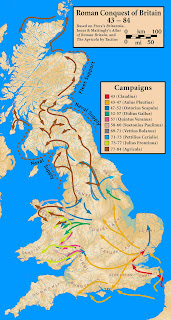FROM PRE-CELTIC TO ROMAN BRITAIN
Six thousand years ago Britain was already inhabited: people grew cereals and wheat. In four centuries the inhabitants changed the landscape and built places for cerimonies like Stonhenge. They also started to work metals and produced pottery and leather.
 The Celts arrived around 700 BC from Germany and settled in the country. They were tall, with blue eyes and blond hair. There were farmers, fishermen and hunters. They built forts on top of the hills as a defence. Women were nearly equal to men: they could choose the man they wanted to marry and could be leaders in wars.
The Celts arrived around 700 BC from Germany and settled in the country. They were tall, with blue eyes and blond hair. There were farmers, fishermen and hunters. They built forts on top of the hills as a defence. Women were nearly equal to men: they could choose the man they wanted to marry and could be leaders in wars.
The Druids were the Celts' priests. They were important not only in religion but also in medicine, justice and education.
The Celts worshipped natural elements (like sun, moon and rivers) and believed in the transmigration of soul from one person to another.
The Romans invaded Britain with Julius Cesar and conquered it with Claudius in 43/47 AD. Romans didn't control the whole island, in fact Emperor Adrian ordered to build a wall to mark the border between Britain and northern population, such as Scots and Picts.
Romans built roads (in order to better move soldiers and make commercial goods move easier) and also many towns and villages. The most important is Londinium, built on the river Thames.
Romans also brought in Britain their culture, the latin language and religion.
In 409 AD their control of Britain came to an end: Roman soldiers had to go back to Rome, in order to fight against Barbarians, and left the Celts to fight alone against the Saxon invaders.
No comments:
Post a Comment